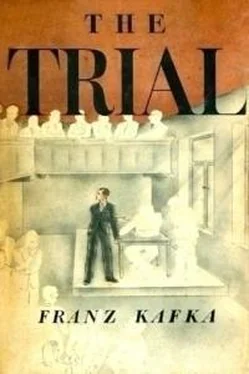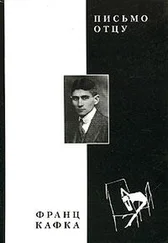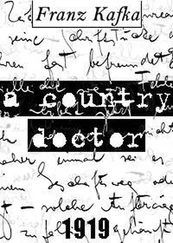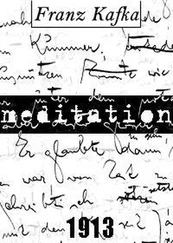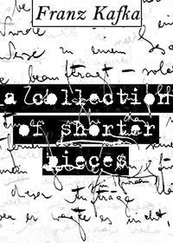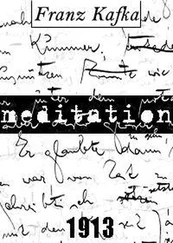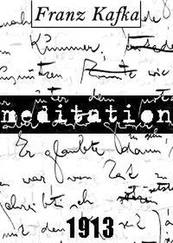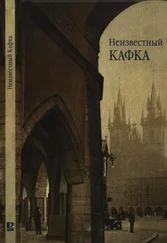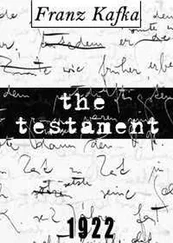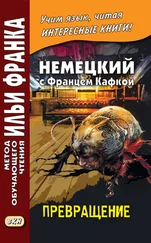Франц Кафка - The Trial
Здесь есть возможность читать онлайн «Франц Кафка - The Trial» — ознакомительный отрывок электронной книги совершенно бесплатно, а после прочтения отрывка купить полную версию. В некоторых случаях можно слушать аудио, скачать через торрент в формате fb2 и присутствует краткое содержание. Год выпуска: 2014, Издательство: epubBooks Classics, Жанр: Классическая проза, на английском языке. Описание произведения, (предисловие) а так же отзывы посетителей доступны на портале библиотеки ЛибКат.
- Название:The Trial
- Автор:
- Издательство:epubBooks Classics
- Жанр:
- Год:2014
- ISBN:нет данных
- Рейтинг книги:3 / 5. Голосов: 1
-
Избранное:Добавить в избранное
- Отзывы:
-
Ваша оценка:
- 60
- 1
- 2
- 3
- 4
- 5
The Trial: краткое содержание, описание и аннотация
Предлагаем к чтению аннотацию, описание, краткое содержание или предисловие (зависит от того, что написал сам автор книги «The Trial»). Если вы не нашли необходимую информацию о книге — напишите в комментариях, мы постараемся отыскать её.
The Trial — читать онлайн ознакомительный отрывок
Ниже представлен текст книги, разбитый по страницам. Система сохранения места последней прочитанной страницы, позволяет с удобством читать онлайн бесплатно книгу «The Trial», без необходимости каждый раз заново искать на чём Вы остановились. Поставьте закладку, и сможете в любой момент перейти на страницу, на которой закончили чтение.
Интервал:
Закладка:
And K. would certainly not have noticed this little pulpit if there had not been a lamp fastened above it, which usually meant there was a sermon about to be given. So was a sermon to be given now? In this empty church? K. looked down at the steps which, pressed close against the column, led up to the pulpit. They were so narrow they seemed to be there as decoration on the column rather than for anyone to use. But under the pulpit – K. grinned in astonishment – there really was a priest standing with his hand on the handrail ready to climb the steps and looking at K. Then he nodded very slightly, so that K. crossed himself and genuflected as he should have done earlier. With a little swing, the priest went up into the pulpit with short fast steps. Was there really a sermon about to begin? Maybe the man in the cassock had not been really so demented, and had meant to lead K.'s way to the preacher, which in this empty church would have been very necessary. And there was also, somewhere in front of a picture of the Virgin Mary, an old woman who should have come to hear the sermon. And if there was to be a sermon why had it not been introduced on the organ? But the organ remained quiet and merely looked out weakly from the darkness of its great height.
K. now considered whether he should leave as quickly as possible, if he did not do it now there would be no chance of doing so during the sermon and he would have to stay there for as long as it lasted, he had lost so much time when he should have been in his office, there had long been no need for him to wait for the Italian any longer, he looked at his watch, it was eleven. But could there really be a sermon given? Could K. constitute the entire congregation? How could he when he was just a stranger who wanted to look at the church? That, basically, was all he was. The idea of a sermon, now, at eleven o'clock, on a workday, in hideous weather, was nonsense. The priest – there was no doubt that he was a priest, a young man with a smooth, dark face – was clearly going up there just to put the lamp out after somebody had lit it by mistake.
But there had been no mistake, the priest seemed rather to check that the lamp was lit and turned it a little higher, then he slowly turned to face the front and leant down on the balustrade gripping its angular rail with both hands. He stood there like that for a while and, without turning his head, looked around. K. had moved back a long way and leant his elbows on the front pew. Somewhere in the church – he could not have said exactly where – he could make out the man in the cassock hunched under his bent back and at peace, as if his work were completed. In the cathedral it was now very quiet! But K. would have to disturb that silence, he had no intention of staying there; if it was the priest's duty to preach at a certain time regardless of the circumstances then he could, and he could do it without K.'s taking part, and K.'s presence would do nothing to augment the effect of it. So K. began slowly to move, felt his way on tiptoe along the pew, arrived at the broad aisle and went along it without being disturbed, except for the sound of his steps, however light, which rang out on the stone floor and resounded from the vaulting, quiet but continuous at a repeating, regular pace. K. felt slightly abandoned as, probably observed by the priest, he walked by himself between the empty pews, and the size of the cathedral seemed to be just at the limit of what a man could bear. When he arrived back at where he had been sitting he did not hesitate but simply reached out for the album he had left there and took it with him. He had nearly left the area covered by pews and was close to the empty space between himself and the exit when, for the first time, he heard the voice of the priest. A powerful and experienced voice. It pierced through the reaches of the cathedral ready waiting for it! But the priest was not calling out to the congregation, his cry was quite unambiguous and there was no escape from it, he called "Josef K.!"
K. stood still and looked down at the floor. In theory he was still free, he could have carried on walking, through one of three dark little wooden doors not far in front of him and away from there. It would simply mean he had not understood, or that he had understood but chose not to pay attention to it. But if he once turned round he would be trapped, then he would have acknowledged that he had understood perfectly well, that he really was the Josef K. the priest had called to and that he was willing to follow. If the priest had called out again K. would certainly have carried on out the door, but everything was silent as K. also waited, he turned his head slightly as he wanted to see what the priest was doing now. He was merely standing in the pulpit as before, but it was obvious that he had seen K. turn his head. If K. did not now turn round completely it would have been like a child playing hide and seek. He did so, and the priest beckoned him with his finger. As everything could now be done openly he ran – because of curiosity and the wish to get it over with – with long flying leaps towards the pulpit. At the front pews he stopped, but to the priest he still seemed too far away, he reached out his hand and pointed sharply down with his finger to a place immediately in front of the pulpit. And K. did as he was told, standing in that place he had to bend his head a long way back just to see the priest. "You are Josef K.," said the priest, and raised his hand from the balustrade to make a gesture whose meaning was unclear. "Yes," said K., he considered how freely he had always given his name in the past, for some time now it had been a burden to him, now there were people who knew his name whom he had never seen before, it had been so nice first to introduce yourself and only then for people to know who you were. "You have been accused," said the priest, especially gently. "Yes," said K., "so I have been informed." "Then you are the one I am looking for," said the priest. "I am the prison chaplain." "I see," said K. "I had you summoned here," said the priest, "because I wanted to speak to you." "I knew nothing of that," said K. "I came here to show the cathedral to a gentleman from Italy." "That is beside the point," said the priest. "What are you holding in your hand? Is it a prayer book?" "No," answered K., "it's an album of the city's tourist sights." "Put it down," said the priest. K. threw it away with such force that it flapped open and rolled across the floor, tearing its pages. "Do you know your case is going badly?" asked the priest. "That's how it seems to me too," said K. "I've expended a lot of effort on it, but so far with no result. Although I do still have some documents to submit." "How do you imagine it will end?" asked the priest. "At first I thought it was bound to end well," said K., "but now I have my doubts about it. I don't know how it will end. Do you know?" "I don't," said the priest, "but I fear it will end badly. You are considered guilty. Your case will probably not even go beyond a minor court. Provisionally at least, your guilt is seen as proven." "But I'm not guilty," said K., "there's been a mistake. How is it even possible for someone to be guilty. We're all human beings here, one like the other." "That is true," said the priest, "but that is how the guilty speak." "Do you presume I'm guilty too?" asked K. "I make no presumptions about you," said the priest. "I thank you for that," said K. "but everyone else involved in these proceedings has something against me and presumes I'm guilty. They even influence those who aren't involved. My position gets harder all the time." "You don't understand the facts," said the priest, "the verdict does not come suddenly, proceedings continue until a verdict is reached gradually." "I see," said K., lowering his head. "What do you intend to do about your case next?" asked the priest. "I still need to find help," said K., raising his head to see what the priest thought of this. "There are still certain possibilities I haven't yet made use of." "You look for too much help from people you don't know," said the priest disapprovingly, "and especially from women. Can you really not see that's not the help you need?" "Sometimes, in fact quite often, I could believe you're right," said K., "but not always. Women have a lot of power. If I could persuade some of the women I know to work together with me then I would be certain to succeed. Especially in a court like this that seems to consist of nothing but woman–chasers. Show the examining judge a woman in the distance and he'll run right over the desk, and the accused, just to get to her as soon as he can." The priest lowered his head down to the balustrade, only now did the roof over the pulpit seem to press him down. What sort of dreadful weather could it be outside? It was no longer just a dull day, it was deepest night. None of the stained glass in the main window shed even a flicker of light on the darkness of the walls. And this was the moment when the man in the cassock chose to put out the candles on the main altar, one by one. "Are you cross with me?" asked K. "Maybe you don't know what sort of court it is you serve." He received no answer. "Well, it's just my own experience," said K. Above him there was still silence. "I didn't mean to insult you," said K. At that, the priest screamed down at K.: "Can you not see two steps in front of you?" He shouted in anger, but it was also the scream of one who sees another fall and, shocked and without thinking, screams against his own will.
Читать дальшеИнтервал:
Закладка:
Похожие книги на «The Trial»
Представляем Вашему вниманию похожие книги на «The Trial» списком для выбора. Мы отобрали схожую по названию и смыслу литературу в надежде предоставить читателям больше вариантов отыскать новые, интересные, ещё непрочитанные произведения.
Обсуждение, отзывы о книге «The Trial» и просто собственные мнения читателей. Оставьте ваши комментарии, напишите, что Вы думаете о произведении, его смысле или главных героях. Укажите что конкретно понравилось, а что нет, и почему Вы так считаете.
